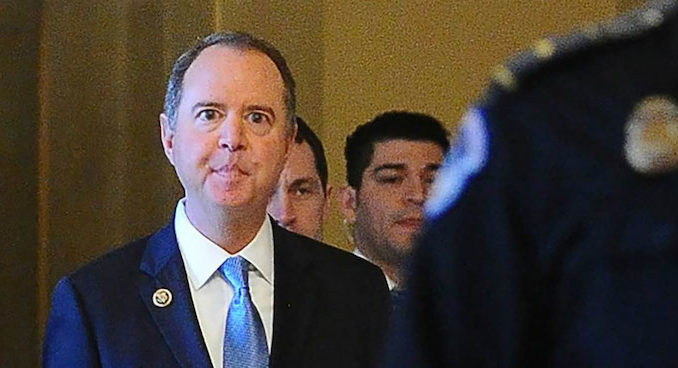
Democrat Rep. Adam Schiff is fighting tooth and nail to keep his shady impeachment subpoenas hidden from the public, according to reports.
Political watchdog Judicial Watch has filed a lawsuit against the former impeachment manager to gain access to his subpoenas.

BYPASS THE CENSORS
Sign up to get unfiltered news delivered straight to your inbox.
You can unsubscribe any time. By subscribing you agree to our Terms of Use
Latest Video
The House Intelligence Committee Chairman is fighting in court to keep the documents under wraps.
Schiff has filed a motion to dismiss the lawsuit filed by Judicial Watch, who requested access to “the controversial subpoenas issued for phone records.”
Washingtonexaminer.com reports: His legal team, led by Douglas Letter, the Democratic-led House’s general counsel, told the U.S. District Court for the District of Columbia on Friday that “these requests and subpoenas were integral to the Committee’s inquiry and consistent with its mandate to investigate and issue a report” about whether Trump should be impeached.
In December, conservative watchdog group Judicial Watch filed the lawsuit against Schiff and his committee seeking access to “the controversial subpoenas issued for phone records,” including those of Trump lawyer Rudy Giuliani. Judicial Watch pointed out that Schiff’s impeachment report included “the publication of the private phone records of Giuliani, Congressman Devin Nunes, journalist John Solomon, Trump attorney Jay Sekulow, attorney Victoria Toensing, and other American citizens.”
Judicial Watch President Tom Fitton, a vocal supporter of Trump, vowed to “push back in court” to shed light on Schiff’s “abuse of power.”
The case is a lingering battle over impeachment. Trump was impeached by the Democratic-led House in December on charges of abuse of power and obstruction of Congress, but acquitted after a trial in the GOP-led Senate in early February.
Republicans criticized Schiff for the tactics he employed. Critics included House Intelligence Committee ranking member Devin Nunes, who called Schiff’s actions a “gross abuse of power.”
In their filing on Friday, Schiff’s lawyers argued Judicial Watch “has not demonstrated that the public interest in disclosure outweighs the House Defendants’ interest in non-disclosure.”
Judicial Watch’s lawsuit argued, “The records are of critical public importance as the subpoenas were issued without any lawful basis and violated the rights of numerous private citizens.” The watchdog further claimed that “disclosure of the requested records would serve the public interest by providing information about the unlawful issuance of the subpoenas” and “the requested records fall within the scope of the public’s right of access to governmental records.”
Schiff’s lawyers claimed that “it is unclear for what precise purpose” Judicial Watch wanted the records and “does not allege whose rights have been violated.”
Back in December, Fitton said that “Schiff abused his power to secretly subpoena and then publish the private phone records, in potential violation of law, of innocent Americans” and claimed that “Schiff and his Committee ran roughshod over the rule of law in pursuit of the abusive impeachment of President Trump.”
Schiff’s lawyers cited four reasons why the court should dismiss the case: They claimed that “the doctrine of sovereign immunity” deprives the court of jurisdiction over House Democrats, argued the records sought by Judicial Watch “are absolutely protected by the Speech or Debate Clause” of the Constitution because they were obtained during impeachment, asserted that the subpoena documents are not “public records” and thus aren’t subject to the common law right of public access, and said Judicial Watch “fails to state a claim because Congress has created a comprehensive scheme for the review of government records — the Freedom of Information Act (FOIA) — that preempts the common law right sought to be vindicated by this litigation.”
Schiff’s team argued that “as part of its impeachment investigation,” the House Intelligence Committee “issued subpoenas to telecommunications providers for certain records” and claimed “the information obtained in response to the subpoenas furthered the Committee’s investigation by establishing connections — specifically, telephone contacts — between relevant individuals at key points in time.” The Democratic lawyers pointed to one specific example, claiming that “in the days immediately preceding the ousting of then-Ambassador to Ukraine Marie Yovanovitch, the records showed repeated telephone contacts between the White House and Rudy Giuliani, between Mr. Giuliani and Lev Parnas, and between Mr. Giuliani and Ambassador John Bolton, suggesting a coordinated effort to remove Ambassador Yovanovitch from her post.”
A member of the Federal Communications Commission has also raised concerns about Schiff’s actions during the Democratic-led impeachment of Trump in 2019.
Brendan Carr, who was picked by Trump to serve as an FCC commissioner and was confirmed by the Senate in 2017 and again in 2019, wrote to the California Democrat on last Thursday to say he was troubled by Schiff’s actions during the Democratic-led impeachment of Trump in 2019. He called for scrutiny of the California Democrat’s secretive subpoenas and questioned whether Schiff was still peering into private records.
Schiff’s impeachment report referenced at least 3,719 pages of such records, and Carr pointed to Section 222 of the Communications Act, which “prohibits any telecommunications carrier from releasing customer call records except as authorized by the customer or as required by law.” The FCC commissioner said, “Federal law has long protected the privacy and confidentiality of Americans’ call records.” He also noted the FCC determined that call records contain “highly-sensitive personal information.”
When Schiff was first criticized for collecting and publishing private call records, he dismissed the concerns.
“The blowback is only coming from the far right,” Schiff said last year. “Every investigator seeks phone records … Here, we had testimony that the president charged Rudy Giuliani with carrying out this plot. Naturally, we wanted phone records to point out they had those conversations.”
“As a country, are we comfortable with one political party in Congress having the unilateral & unchecked power to secretly obtain & publicize the confidential call records of any private citizen, journalist, or government official?” Carr asked. “Chairman Schiff has been doing exactly that.”


